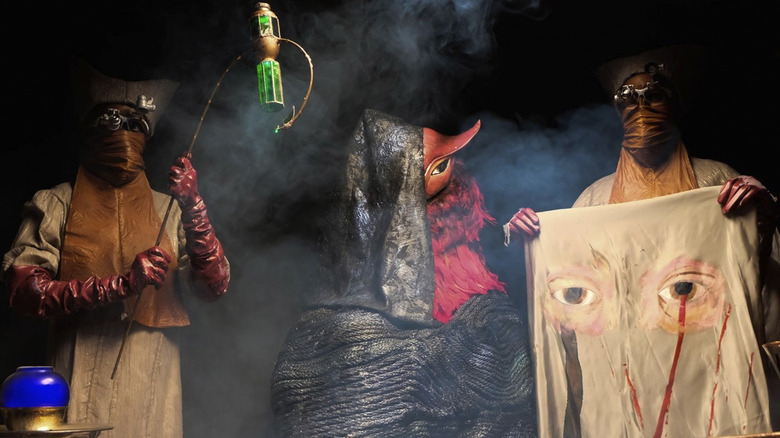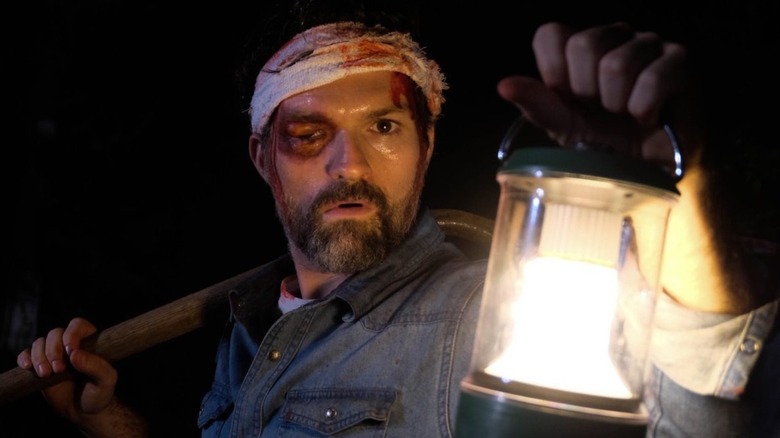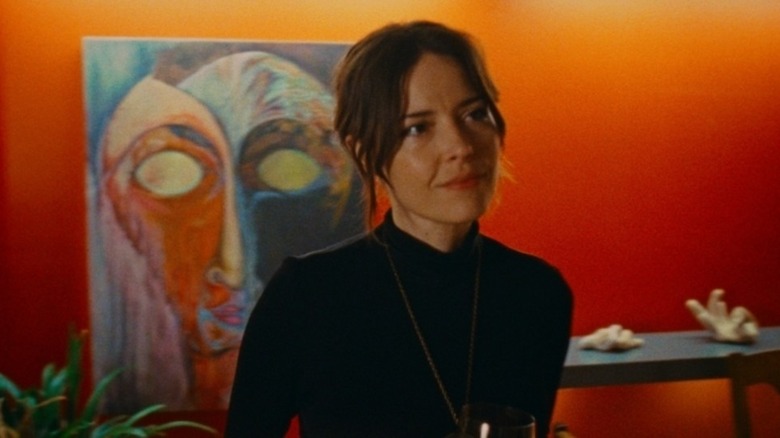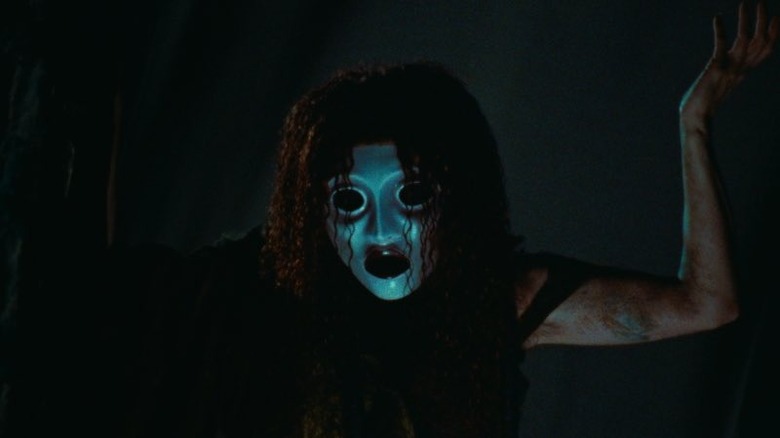The Team Behind Shudder's A Wounded Fawn Talk Shooting On 16mm And That Credit Scene [Exclusive Interview]
Shudder has developed a knack for being one of the most well-curated streaming services out there. For as much as other services like Netflix or HBO Max have much more to offer in terms of quantity, to the subscriber, those offerings can feel like a ton of fluff. With Shudder, it is a more targeted, "less is more" approach. But that's not to say they don't have a little something for everyone. Case in point, within a small window of time, they can release a sweet vampire comedy like "Blood Relatives," then turn right around and release one of the weirdest movies of the year with "A Wounded Fawn," which just made its debut on the service.
Hailing from director Travis Stevens ("Jakob's Wife"), "A Wounded Fawn" follows the story of Meredith Tanning (Sarah Lind), a local museum curator who is dipping her toe back into the dating pool, only to be targeted by a charming serial killer (Josh Ruben). A fateful romantic getaway between the two becomes a tense game of cat and mouse, forcing them (and the audience) to address the madness within this killer.
I had the pleasure of seeing the film at Fantastic Fest earlier this year and it was one of the most bizarre experiences I've had in a theater in quite some time. I also had the good fortune of speaking to Stevens, Lind, and Ruben after the screening to get some insight into how this wild movie came to be. We discussed the movie's practical visual effects, how the two-handed nature of the film required a great deal of trust, the success of Ruben's video game movie "Werewolves Within," and much more.
'What can we do to make this something we haven't seen before?'
We are here to primarily talk about "A Wounded Fawn," which is the movie you guys have here at the fest, which I saw the other night. It's one of those things where, I saw "The Menu" last night, which was a big studio movie. I saw "Smile," a big scary movie. And then I saw this, and if I see a weirder movie this week...
Lind: Let us know. We'll kill them.
Great. Where does this start? Where does this generate from?
Stevens: Well, on one level, it started as a script that came to me through the producers, originally written by a guy, Nathan Faudree. I think the other level is, what we're doing here are at Fantastic Fest, as movie lovers, is we're trying to find that next hit, that thing that we haven't experienced before. I think that craving is what I'm looking for when I get involved with a project, so I'm kind of on that script, right? What can we do to make this something we haven't seen before? I think it starts at that point of wanting to try to push things into a new area.
Then for you guys, when you get involved, you see a script and do you have a sense for how weird it's actually going to turn out to be when it's on the page?
Lind: I had a sense, because I know Travis pretty well. A lot of it was in the script, a lot of the images, so it wasn't a total surprise, because it was practical too, most of it. We saw it on the day, which was really nice, and I think that was the big surprise, just to see the — whatever that was — the X-ray scene with the owl and the surgery scene.
Ruben: Yeah, you always have an idea in your head of what it might be, but when you're working with a visionary like Mr. Stevens, you gather, "Oh, there really is a pipe-puppet trying to bite me." This Bubonic Plague era, surgeons with this owl image. Every kind of turn of it exceeded my expectations. And then the 16 millimeter of it all.
Lind: Mm-hmm.
Ruben: I mean, that puts it on a whole other level. I remember the first time watching it at Tribeca, just seeing the grain, and the effect, and the leveling up it does, it just makes it a whole other film, along with the sound design, and score, and everything. It really exceeded my expectations.
What's interesting about it being shot on 16 millimeter is it makes it feel like you're watching something you shouldn't be watching. Even when it first starts you're like, "I don't know." All of those the entities throughout the movie, the owls and all of those things, those were mostly practical, I assume, but is that tough to accomplish on what I assume is not an extravagant budget?
Stevens: Yeah [pause].
Ruben: Perfect [laughs].
Stevens: I think the fun aspect of the process is trying to figure out the engineering to capture something like that live. It has a bit of a backyard play quality. You're getting together with your friends and you're like, "Okay, now the stage coach is going to come in," and here comes the piece of cardboard that everybody's moving across the stage. There are people who probably think of cinema in a very technical pre-viz way, and I like to think [of] things more tactile, and "let's get the miniatures out, and the puppets out, and the paints out, and let's build it with our hands rather than with the computer." We obviously have CG in the movie, I'm not disparaging that, but there's something about that aspect that everybody can contribute to in real time. I think that's part of the personality of the film.
Like you guys said, when you have something to actually react to other than a tennis ball.
Lind: Yeah. And you get ideas from it. When you don't know what it is you are working with, it's hard to get ideas or inspiration from it, so you're just doing the best you can. If you have a costume on or a mask, it's sort of like, "Oh, what happens if the costume moves this way? Oh, what does it look like if the dick puppet moves like this?" That's part of the alchemy of practical.
Ruben: And that's before the snakes are crawling all over you. It's just like...
That answers a question. Because there's a point in the movie where it becomes very unclear what's exactly happening. And let me tell you, at 1:30 in the morning, being real tired, you're like, "All right, cool, the pipe's trying to eat him. I'm here." So it is actually still you under the mask?
Lind: Yeah. I think that was an important part of the story. It's a pretty untraditional arc. I think, in my opinion.
'I was like, 'F***, yeah. Let's go''
I don't want to spoil it for anybody, but you get to a good point. It kind of ends in a place where now I understand what was going on. But how fun or awkward was it filming that credit sequence? Because you were just, for what felt like 45 minutes, you were just looking at him. You literally don't move. So what was that like filming that?
Ruben: I mean, wet, a little chilly. I love those kinds of weird choices, and moments, and sequences. I mean, when I had heard we're going to do a full 11 minute reel, I was like, "F***, yeah. Let's go."
It was 11 minutes?!
Ruben: Yeah. I think they were 11 minute reels, is that right?
Stevens: Yeah. So we'd shoot on film, there's X number of feet in the canister and so, at that point in the movie, these two, we're jamming together and we were like, "Let's just do this. We're just going to roll one entire reel, and see what happens."
Ruben: And he beat Ti West to the punch. Sorry, "Pearl."
I saw "Pearl" before this and I was thinking, "Geez man, this year with the credit scene." But you popped up in, I saw "Blood Relatives."
Ruben: Same character.
I would buy that.
Ruben: That's a prequel.
A very large chunk of the movie largely rests completely on both of your shoulders. There are other people that show up, but I mean, it is mostly a two-hander. So what is that like as an acting challenge? To just be like, "We're not really part of an ensemble here. This is very much our movie."
Lind: Well, when you're working with someone who is really nice to work with, it's a pleasure. I think it was really clear what we were doing. With Travis, it felt great to me. I think maybe because it was mostly the two of us, it was sort of like, "Okay, let's keep going, let's keep going." Not that we ever said any of that while we were going.
Ruben: It was great though, because to have the freedom and the time, we kind of did have time. It was a very, very thoughtful approach to the schedule, to get there and do what we needed to do. It was a little bit of taking advantage of the weight of each scene, and probably subconsciously pushing it without saying, "Yeah! Let's push it on that one."
Lind: Yeah. Yeah.
Ruben: I think we both knew to play a little bit and then, again, it has to do with Travis setting the stakes for us to have that room to play. I think it's just probably, not speaking for Sarah, but I think it's just two performers who just love to take out that space, and live in that awkwardness, or that weirdness, or that playground.
Lind: Yeah.
Ruben: And again, the prep of conversation, that was everything.
For Travis, how do you arrive at these two for the roles?
Stevens: Yeah, and this is probably true of all aspects of life beyond the filmmaking, but I think it's about establishing trust. Sarah and I have known each other for a long time, so that trust was there already, but I think even though Josh and I hadn't met, before this movie, I think in your work, in the films that he's written and made himself, I got enough of his personality that I was like, "This guy can play. I mean, we became best friends [laughs]. It just makes everything that follows easier because you're like, "This person gets it." If you've been friends with somebody for a long time, then the jokes come easy.
Ruben: It was the same thing watching Travis' previous works. It's like, you are taking slow pushes in, interesting choices with sound design, and everything else. There is probably an unspoken artistry.
You artistically recognize something in each other.
Ruben: Yes. Yes. Nothing derivative here. This is going to be a playground. I read the script. I think my words were truly like, "This is genius, I have to do this," and then to get there and have –
Stevens: On Twitter DM's.
Ruben: On Twitter [laughs].
Stevens: Which was the best.
You know, people give Twitter s***, but I'll tell you what, the only reason I'm here interviewing you guys and have the job that I have because of Twitter.
Lind: Twitter is a hellscape, but also I get so much from it.
Ruben: It really is.
Lind: It's ruining my life, but also...
Yeah. Look, you make what you make of it.
Lind: It's enriching, while also tearing you down.
'You can't set impossible parameters for creativity'
Josh, Travis touched on your filmography and if I can just go off topic for just a second, I've been fascinated — I've played video games my whole life and it's always amazed me how Hollywood has failed so miserably so many times to adapt video games. You, technically speaking, I don't even know if you're aware of this, have by far the best reviewed video game movie of all time ["Werewolves Within"].
Ruben: The reason why that worked is because Ubisoft cut a check for a modest budget — by all considerations, low budget — and trusted a filmmaker to go do their thing, as opposed to saying, "It's going to be this! You have to hit all these points!" Then, that raised the bar for me to go, "Ooh, now what would be interesting for me as an audience member with the Easter eggs?" That has everything to do with trust. Everything to do with, "Well, yeah, it looks like he can play." You can't set impossible parameters for creativity. And they trusted the right filmmaker, I guess, for that video game, and it worked because they kind of let me off the leash.
It also helped that you weren't making "Halo."
Ruben: Oh yeah, there weren't 50 producers going, "Why aren't you looking at the kitchen?" Or whatever.
I did find that interesting. For whatever reason, it was really the first one that nailed across the board. I thought that was pretty awesome that you happen to be the guy.
Ruben: Sorry, Sonic.
In fairness to "Sonic [The Hedgehog]," this is a gripe that I have in general, is that people tend to be hard on things just because it's not for them. And my thing is, "Sonic" is really made for...
Ruben: It's a different demo.
It's a different demographic, and it's a very harmless movie. It's made for certain people. That doesn't mean you are hard on it just because you can't connect with that, because you're 40 years old and you remembered playing "Sonic."
Ruben: Hey, if Sega came to me and they asked me to do that and I said, "I want to do Amblin by way of 'Fargo,' but with Sonic," and they said yes, that probably would've been a very strange, very different movie.
I would definitely run that by the Sega people, at least.
Ruben: [Movie trailer voice] Frances McDormand is Dr. Robotnik.
"A Wounded Fawn" is now streaming on Shudder.



